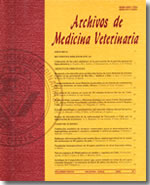Selection indexes and criteria comparisons in Merino Precoz sheep kept under range conditions in central Chile
Main Article Content
Abstract
The aim of this study was to calculate and compare efficiency of four selection indices (IS) in dual purpose sheep. Selection indices were calculated using records of the Merino Precoz sheep flock of the Estación Experimental Rinconada de Maipú, University of Chile. The traits included in the breeding objective for each IS were: greasy fleece weight (GFW), fibre diameter (FD), birth weight (BW) and birth to weaning growth rate (GR). Genetic parameters were obtained from the literature and phenotypic parameters belong to the population. Genetic-economic changes (ΔΗ), which would result as a consequence of using each index with and without constraints, and when selection is realized to change a single trait, were estimated. The efficiency of each IS was compared in relation to IS1 which considered GFW, FD, BW and GR as both selection objective and selection criteria. In the simulations, GR was the trait that contributed most to the breeding goal. Although Merino Precoz is a dual purpose breed, relative importance of traits associated to wool were lower than those related to body weight, because when GFW and FD were restricted a relative high efficiency, compared to IS1, was still obtained (87.89%) which is very similar to selecting only for GR (85.43%). Under the current Chilean economic scenario, FD restriction for this breed would be recommended because efficiency, when DF was restricted, was 98.85% of that reached by the unrestricted IS1. It was noted that, when three of the unrestricted selection index simulated, genetic gain in GR was slightly greater than what was obtained by selecting solely for GR (5.96, 6.35 and 6.19 g per day-1 vs. 5.91 g per day-1). From all the selection indexes without constrain, it is expected a small increase in FD (<1%).

